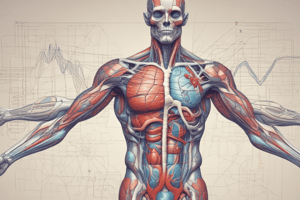Podcast
Questions and Answers
What is the implication of a high equilibrium constant (k > 10^2)?
What is the implication of a high equilibrium constant (k > 10^2)?
- The reaction is strictly reversible
- The reaction is irreversible
- A large amount of reactants are formed
- A significant amount of products are formed (correct)
What happens when the equilibrium constant is less than 10^-2?
What happens when the equilibrium constant is less than 10^-2?
- The reaction is complete
- The reaction is slower
- Only a small amount of products are formed (correct)
- Only reactants are formed
What does a large equilibrium constant indicate?
What does a large equilibrium constant indicate?
- The reaction is incomplete
- The reaction is fast
- The reaction favors the products (correct)
- The reaction is slow
What is the consequence of a low equilibrium constant?
What is the consequence of a low equilibrium constant?
What does an equilibrium constant of less than 10^-2 suggest?
What does an equilibrium constant of less than 10^-2 suggest?
What percentage of interstitial fluid is found in the blood plasma?
What percentage of interstitial fluid is found in the blood plasma?
What is the primary function of interstitial fluid in the blood plasma?
What is the primary function of interstitial fluid in the blood plasma?
Which of the following substances is NOT typically dissolved in interstitial fluid?
Which of the following substances is NOT typically dissolved in interstitial fluid?
What is the primary function of ATP in the body?
What is the primary function of ATP in the body?
Which of the following ions is typically dissolved in interstitial fluid?
Which of the following ions is typically dissolved in interstitial fluid?
What is the role of oxygen in the living system?
What is the role of oxygen in the living system?
What is the function of a reactant in the living system?
What is the function of a reactant in the living system?
What is the primary role of oxygen in chemical reactions?
What is the primary role of oxygen in chemical reactions?
What is the function of transporting oxygen to the cell?
What is the function of transporting oxygen to the cell?
What is the outcome of transporting oxygen to the cell and removing waste products?
What is the outcome of transporting oxygen to the cell and removing waste products?
What is the location of the purple-coloured ring formed during the Molisch test?
What is the location of the purple-coloured ring formed during the Molisch test?
What is the purpose of the Molisch test?
What is the purpose of the Molisch test?
What is the colour of the ring formed during the Molisch test?
What is the colour of the ring formed during the Molisch test?
What is the negative result of the Molisch test?
What is the negative result of the Molisch test?
What is the substance required for the Molisch test?
What is the substance required for the Molisch test?
Which of the following conditions is associated with increased serum bilirubin?
Which of the following conditions is associated with increased serum bilirubin?
What is the result of cirrhosis of the liver?
What is the result of cirrhosis of the liver?
What is the function of proteins in the body?
What is the function of proteins in the body?
Which of the following is a cause of jaundice?
Which of the following is a cause of jaundice?
What is the result of biliary stricture?
What is the result of biliary stricture?
Flashcards are hidden until you start studying


